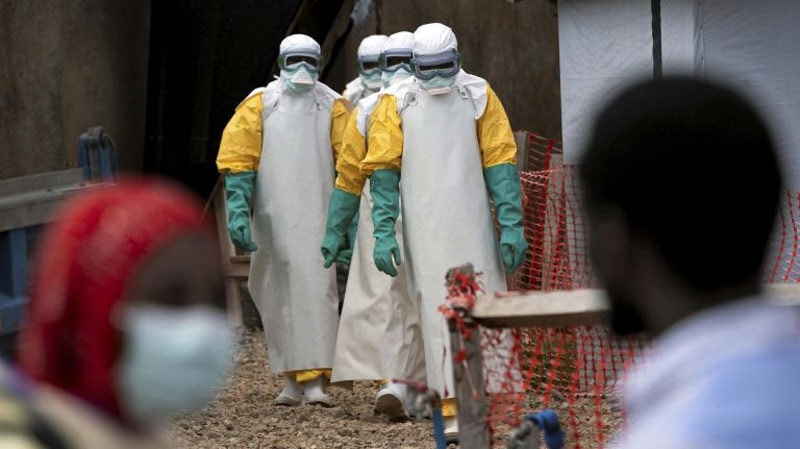Lessons from Ebola: The key to ending Covid-19
"Too many lives have been lost. Families, communities and nations have been devastated… Our tireless efforts have paid off, but the last mile is always the hardest."
In an article in the Los Angeles Times on September 29, the authors of the article David Heymann, Ashish Jha and Edward Kelley quoted this statement by United Nations Secretary-General Ban Ki-moon in April 2015 before world leaders about the crisis.Ebola epidemicin West Africa.
|
| Health workers wearing protective gear begin their shift at an Ebola treatment center in Beni, Congo, in July 2019. Photo: AP |
The authors further pointed out that, at the conferenceCovid-19Last week, when President Joe Biden and his team asked heads of state and industry to make a new commitment to ending the Covid-19 pandemic, they seemed to forget the very issue that Ban Ki-moon raised six years ago: the last mile.
The contexts of the two meetings were quite different, according to the three experts. In 2015, the question of how to strengthen health systems was a focus from the start of the outbreak in several countries. That outbreak, though deadly, did not last long. Today, the world is still battling Covid-19, nearly two years after the pandemic began, spreading and claiming the lives of more than 65,000 people a week.
Progress in the fight against Covid-19 has been limited, with only 2% of people in the developing world vaccinated against the virus. Most health systems are already stretched. Disruptions to routine immunization have left 23 million children missing out on standard immunizations in 2020-21, the highest number in a decade, UNICEF and the World Health Organization (WHO) said.
All of this means that much of the work to address this pandemic is still ahead. We need to act decisively and urgently to deliver on the commitments we have made for billions of doses of vaccines, for life-saving therapies and oxygen, and for mechanisms that will be put in place at a global level to help us be better prepared for the future.
But a crucial element was left out of last week’s summit goals: How will we actually vaccinate, save lives, and improve preparedness to reach the billions of people who still lack access to effective health care systems?
On global vaccination, the current priority is to deliver 2.4 billion doses to the developing world by the end of 2021 to reach the milestone of vaccinating 40% of the population. Every day, global partners try to create hope with images of vaccines on airport tarmacs. However, so far, only 5 countries have delivered 70% of this target.
COVAX, a globally coordinated vaccine-sharing mechanism, had to cut its plans by 30% in September. WHO said that more than a third of African countries have a large gap in their capacity to distribute vaccines to the district level, because of disruptions in “last mile” distribution systems, as the UN secretary-general cited during the 2015 Ebola outbreak.
More importantly, we do not have enough syringes to carry out global vaccination. Current estimates suggest that the world is short at least 5 billion syringes for the Covid-19 vaccination campaign. In 1999, a joint policy of WHO, UNICEF and the United Nations Population Fund called on all partners to fund “not just vaccines but also their safe management.”
What is worrying is that most of the current aid to countries does not include syringes. Experts estimate that if this gap is not filled, we could see 2-3 million deaths from infections caused by reused syringes.
It is also urgent to bring the focus back to the goal of “saving lives.” So far, solutions have focused on purchasing equipment rather than on the frontline care and vaccination teams. What is needed now is to train and deploy frontline health workers, including finding ways for public health workers to be more actively involved in vaccination efforts while the medical workforce focuses on Covid-19.
Meanwhile, the effort to rebuild broken systems is just beginning. Debates raged at the World Health Assembly (WHA) last spring, and will continue to rage beyond this one. So far, the most contentious issue has been how to scale up manufacturing.
Again, we are focusing only on “first mile” issues and ignoring questions about how countries can actually manage the end of the vaccine supply chain, which is filling, finishing and safely distributing vaccines to the population.
In March 2015, countries made a commitment that was supposed to help create a world where there would be no more Ebola outbreaks. But it didn’t work out as hoped, because people forgot the most important part: the final stretch.
And the international community cannot let the commitments of the last conference fall into a similar trap, according to the three authors of the article.
David Heymann is professor of infectious disease epidemiology at the London School of Hygiene & Tropical Medicine. Ashish Jha is dean of the Brown University School of Public Health. Edward Kelley is global chief medical officer of ApiJect Systems Corp., a company that specializes in injectable medicines.

